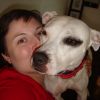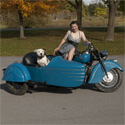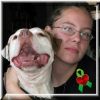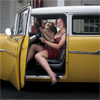http://getthemesscleanedup.blogspot.com ... ntage.html if yall would like to get a feel for my dog take a look. I dedicated a blog to him with pics. I do everything from my iPhone and it's just easier to post pics that way. On to issue at hand...(clears throat)
since becoming pregnant my male pitbull who will b two in December or thereabouts has become totally agressive towards people he doesn't know who step to me or come in our yard. I've never seen him become agressive towards a female until yesterday. It's always been males. If they even ask me a question like what kind of dog he is, he goes nuts. Hair stands on end. Full throttle growl and ready to pounce. It was never an issue until i got pregnant. People could come in my house that he didn't know and he would be chill as ever.
Yesterday a little girl who has never played over here before came on our front porch and he started going nuts on our old antique glass door. I thought the glass was gonna shatter he was going so hard. I was getting ready to walk him so I went ahead and took him outside and he kept on at the little girl. All the other kids were around and he would flop down on his back for a belly rub but the moment this little girl stepped toward me he started in with the warning growl before snapping up in an attack position. The father of the daughter came up towards me and he did the same. All the agression was toward this little girl and her father. The other kids got no agression. None. Later after the walk we went to visit with neighbor and they got company. I was a little worried he was gonna snap out again but he didn't. Those kids or mother didn't come up to me. He didn't pay them any attention. I do not want to euthanize my dog. I want to correct this behavior. Do yall think he has become this way because I'm pregnant? What can I try to correct him? Thank yall!
I'm pregnant and my male pit has gone bonkers!
17 posts
• Page 1 of 1
In my opinion, what you are describing is extremely dangerous behavior and requires immediate attention from a dog trainer. Given the reputation the Pit Bull has in most places right now, this makes it that much more important that you keep him away from people until you have fixed this.
I do not think that anyone here should give you any advice, as no one has seen the dog's behavior in person and there can be elements of what is going on with him that are "lost in translation" on the internet. Given that and the dangerous behavior you are describing, you need a dog trainer.
Until you get this aggressive behavior solved, please keep him away from strangers or people you think he might react to, it sounds as if he is quite likely to bite someone.
Depending on your location, we may have someone on here who lives near you and can recommend a trainer.
I sympathize with your situation!
I do not think that anyone here should give you any advice, as no one has seen the dog's behavior in person and there can be elements of what is going on with him that are "lost in translation" on the internet. Given that and the dangerous behavior you are describing, you need a dog trainer.
Until you get this aggressive behavior solved, please keep him away from strangers or people you think he might react to, it sounds as if he is quite likely to bite someone.
Depending on your location, we may have someone on here who lives near you and can recommend a trainer.
I sympathize with your situation!
I can only please one person per day. Today is not your day, tomorrow doesn't look good either.
_______________________________________
"You didn't know of the magical powers of the break stick? It's up there with genies and Harry Potter as far as magic levels go." SisMorphine 01/07/07
_______________________________________
"You didn't know of the magical powers of the break stick? It's up there with genies and Harry Potter as far as magic levels go." SisMorphine 01/07/07
-

Malli - E-I-E-I-O!
- Posts: 6341
- Location: CANADA EH?
Please, please, please get professional help immediately. If you're near Chicago, this trainer works with human aggressive dogs and has a good reputation for staying on top of learning theory and practice:
http://www.barkerbehavior.com/about_bra ... ining.html
She's part of the "truly dog friendly" network, which usually means good things.
This link takes you to other trainers in that network, and others may be closer to you:
http://www.trulydogfriendly.com/blog/?page_id=4
While you are working to find a trainer, you absolutely have to stop letting your dog interact with kids or strangers, and stop letting her scream at the glass door. Online, we cannot possibly evaluate such a potentially serious situation. You really, really need in-person, professional help immediately.
I noticed on your blog how adorable your dog is. And I also noticed how one of your children is hugging the dog around the neck. Please realize that most dogs really dislike being hugged, and it can stress a dog enough so that she snaps at the child.
http://www.barkerbehavior.com/about_bra ... ining.html
She's part of the "truly dog friendly" network, which usually means good things.
This link takes you to other trainers in that network, and others may be closer to you:
http://www.trulydogfriendly.com/blog/?page_id=4
While you are working to find a trainer, you absolutely have to stop letting your dog interact with kids or strangers, and stop letting her scream at the glass door. Online, we cannot possibly evaluate such a potentially serious situation. You really, really need in-person, professional help immediately.
I noticed on your blog how adorable your dog is. And I also noticed how one of your children is hugging the dog around the neck. Please realize that most dogs really dislike being hugged, and it can stress a dog enough so that she snaps at the child.
-

tiva - Snot Nose Bully Pup
- Posts: 165
- Location: WI
I will work on finding dog trainer immediately. I'm in southern Illinois. Cosby has been hugged around the neck by my children since he was brought home. He has never acted out because of that. I'm keeping him away from strangers. I do hope this is something that can be fixed. He is very gentle with the kids. Ok. So dog trainer it is
- laurieellis27
- Just Whelped
- Posts: 4
- Location: southern illinois
Just because he has tolerated the neck grabs doesn't mean he likes them. Especially since he's starting to get more defensive you need to be very careful. Perhaps keep the door shut so he can't see outside. Obviously don't let people come up to him. Has he been to a vet recently? Maybe there's a health issue.
I know I've heard of dogs becoming protective when people get pregnant but you still need to be very careful that he doesn't hurt somebody.
I know I've heard of dogs becoming protective when people get pregnant but you still need to be very careful that he doesn't hurt somebody.
"Remember - every time your dog gets somewhere on a tight leash *a fairy dies and it's all your fault.* Think of the fairies." http://www.positivepetzine.com"
http://www.pitbullzen.com
http://inaradog.wordpress.com
http://www.pitbullzen.com
http://inaradog.wordpress.com
-

pitbullmamaliz - Working out in the buff causes chafing
- Posts: 15438
- Location: Cleveland, OH
tiva wrote:While you are working to find a trainer, you absolutely have to stop letting your dog interact with kids or strangers, and stop letting her scream at the glass door. Online, we cannot possibly evaluate such a potentially serious situation. You really, really need in-person, professional help immediately.
I agree fully
I noticed on your blog how adorable your dog is. And I also noticed how one of your children is hugging the dog around the neck. Please realize that most dogs really dislike being hugged, and it can stress a dog enough so that she snaps at the child.
and again, I agree fully
tiva wrote:She's part of the "truly dog friendly" network, which usually means good things.
On this, not so much. Using corrections in training is not the end of the world, and sometimes even get results a little faster... and in this situation, time is unquestionably of the essence. And yes, the results are just as reliable/ safe/ dependable/ lasting when the training is done by someone who knows what they are doing - just as with every training method.
ANYway...
While you are looking for a trainer, get a clicker and start working on focus exercises. There are lots of threads here about them. You want to get your dog conditioned to breaking her "hyper focus" on the stimulation and looking at you when you say "look" / "watch me" / or whatever. That's what we start with in my Brats class - the first few weeks are getting the dogs to break their attention off of everything else to go get treats from their owners. All positive, all happy. Attention work never hurts anything and will be helpful no matter what trainer you end up with.
Michelle
Inside me is a thin woman trying to get out. I usually shut the bitch up with a martini.
Inside me is a thin woman trying to get out. I usually shut the bitch up with a martini.
-

mnp13 - Evil Overlord
- Posts: 17234
- Location: Rochester, NY
Ok so no more neck grabs.... I've not had any health issues with him so he hasn't been to the vet in about five months or so. He is up to date with shots. He gets his monthly heartworm and flea and tick preventative. I'm gonna work double time with him in training. I hope I can pull this off. No dog trainers around here in podunkville unless u count petsmart.
- laurieellis27
- Just Whelped
- Posts: 4
- Location: southern illinois
laurieellis27 wrote:I will work on finding dog trainer immediately. I'm in southern Illinois. Cosby has been hugged around the neck by my children since he was brought home. He has never acted out because of that. I'm keeping him away from strangers. I do hope this is something that can be fixed. He is very gentle with the kids. Ok. So dog trainer it is
I believe you, but... and this is a BIG BUT... many times a really agitated dog will get so frustrated by not being able to "get at" whatever they perceive as a threat (whether it's because they are on-leash, or there is some type of barrier in place, like a door, fence, etc.) that they will act without thinking and redirect their aggression towards whomever is physically the closest to them at that time.
I would definitely ask your children to refrain from getting that close to Cosbys face and teeth, and have a *no-hugging* rule in place until you consult/work w/a qualified and reputable trainer and/or behaviorist.
I have no doubt that Cosby loves and adores your kids, but animals don't always act "rational" under the best of circumstances, so... better safe than sorry.
-

amazincc - Jessica & Mick
- Posts: 9814
- Location: Holding them both in my heart.
laurieellis27 wrote: I'm gonna work double time with him in training. I hope I can pull this off. No dog trainers around here in podunkville unless u count petsmart.
Can you ask your vet to recommend someone?
I lived w/an HA dog for almost seven years, and I wouldn't advise attempting to "fix" this on your own.
-

amazincc - Jessica & Mick
- Posts: 9814
- Location: Holding them both in my heart.
Everyone's had good suggestions so far...
just to jump in on what you said Michelle...
the reason I don't want someone using corrections for a really bad aggression problem is that you're just going to be suppressing the behavior...and sure, it might be a quick fix, but you haven't changed the "WHY". Why is the dog suddenly feeling like this, why is the dog acting out with such intensity, etc. This can become even more dangerous, because it leaves people with a false sense of security. The dog stops acting out, but hasn't changed the feelings behind the behavior.
just to jump in on what you said Michelle...
On this, not so much. Using corrections in training is not the end of the world, and sometimes even get results a little faster... and in this situation, time is unquestionably of the essence. And yes, the results are just as reliable/ safe/ dependable/ lasting when the training is done by someone who knows what they are doing - just as with every training method.
the reason I don't want someone using corrections for a really bad aggression problem is that you're just going to be suppressing the behavior...and sure, it might be a quick fix, but you haven't changed the "WHY". Why is the dog suddenly feeling like this, why is the dog acting out with such intensity, etc. This can become even more dangerous, because it leaves people with a false sense of security. The dog stops acting out, but hasn't changed the feelings behind the behavior.
"I don't have any idea if my dogs respect me or not, but they're greedy and I have their stuff." -- Patty Ruzzo
"Dogs don't want to control people. They want to control their own lives." --John Bradshaw
"Dogs don't want to control people. They want to control their own lives." --John Bradshaw
-

TheRedQueen - I thought I lost my Wiener... but then I found him.
- Posts: 7184
- Location: Maryland
You are welcome to jump 
I believe you can correct a behavior without suppressing it.
I agree with you that this also needs to be addressed.
I believe you can correct a behavior without suppressing it.
TheRedQueen wrote:The dog stops acting out, but hasn't changed the feelings behind the behavior.
I agree with you that this also needs to be addressed.
Michelle
Inside me is a thin woman trying to get out. I usually shut the bitch up with a martini.
Inside me is a thin woman trying to get out. I usually shut the bitch up with a martini.
-

mnp13 - Evil Overlord
- Posts: 17234
- Location: Rochester, NY
mnp13 wrote:You are welcome to jump
I believe you can correct a behavior without suppressing it.TheRedQueen wrote:The dog stops acting out, but hasn't changed the feelings behind the behavior.
I agree with you that this also needs to be addressed.
My other issue with adding a correction is that it's soooo tricky to not add another element to the dog's aggressive behavior...meaning, it's hard to keep that correction from becoming *another* reason the dog uses for aggressing. "Wow collar pop...just as I was lunging for that small child...that makes that child DOUBLY awful now!"

"I don't have any idea if my dogs respect me or not, but they're greedy and I have their stuff." -- Patty Ruzzo
"Dogs don't want to control people. They want to control their own lives." --John Bradshaw
"Dogs don't want to control people. They want to control their own lives." --John Bradshaw
-

TheRedQueen - I thought I lost my Wiener... but then I found him.
- Posts: 7184
- Location: Maryland
TheRedQueen wrote:My other issue with adding a correction is that it's soooo tricky to not add another element to the dog's aggressive behavior...meaning, it's hard to keep that correction from becoming *another* reason the dog uses for aggressing. "Wow collar pop...just as I was lunging for that small child...that makes that child DOUBLY awful now!"
I agree with you on that. However, that is an issue of incorrect use, which is not the fault of the method.
My point was that in looking for a trainer to work with, there is no reason to categorically rule out trainers that happen to also use corrections as part of their repertoire.
Michelle
Inside me is a thin woman trying to get out. I usually shut the bitch up with a martini.
Inside me is a thin woman trying to get out. I usually shut the bitch up with a martini.
-

mnp13 - Evil Overlord
- Posts: 17234
- Location: Rochester, NY
mnp13 wrote:
My point was that in looking for a trainer to work with, there is no reason to categorically rule out trainers that happen to also use corrections as part of their repertoire.
All trainers use corrections. Trainers who are members of "truly dog friendly" group use negative punishment, rather than physical aversives (typically positive punishment or negative reinforcement) as part of their corrections. You may feel that physical aversives are appropriate as an approach to aggression in dogs, but the American Veterinary Society of Animal Behavior disagrees with you:
http://www.avsabonline.org/avsabonline/ ... ements.pdf
Recent peer-reviewed research does support the AVSAB's concern that physical punishment increases aggression in dogs:
Herron et al. Survey of the use and outcome of confrontational and non-confrontational training methods in client-owned dogs showing undesired behaviors. Applied Animal Behaviour Science, 2009; 117 (1-2): 47 DOI: 10.1016/j.applanim.2008.12.011
-

tiva - Snot Nose Bully Pup
- Posts: 165
- Location: WI
tiva wrote:Recent peer-reviewed research does support the AVSAB's concern that physical punishment increases aggression in dogs:
Herron et al. Survey of the use and outcome of confrontational and non-confrontational training methods in client-owned dogs showing undesired behaviors. Applied Animal Behaviour Science, 2009; 117 (1-2): 47 DOI: 10.1016/j.applanim.2008.12.011
That survey falls under the "no crap" category of training. Here is a quote from the abstract:
http://www.appliedanimalbehaviour.com/a ... 7/abstract
Prior to seeking the counsel of a veterinary behaviorist many dog owners have attempted behavior modification techniques suggested by a variety of sources. Recommendations often include aversive training techniques which may provoke fearful or defensively aggressive behavior. The purpose of this study was to assess the behavioral effects and safety risks of techniques used historically by owners of dogs with behavior problems.
A 30-item survey of previous interventions was included in a behavioral questionnaire distributed to all dog owners making appointments at a referral behavior service over a 1-year period. For each intervention applied, owners were asked to indicate whether there was a positive, negative, or lack of effect on the dog's behavior, and whether aggressive behavior was seen in association with the method used. Owners were also asked to indicate the source of each recommendation. One-hundred-and-forty surveys were completed. The most frequently listed recommendation sources were “self” and “trainers”. Several confrontational methods such as “hit or kick dog for undesirable behavior” (43%), “growl at dog” (41%), “physically force the release of an item from a dog's mouth” (39%), “alpha roll” (31%), “stare at or stare [dog] down” (30%), “dominance down” (29%), and “grab dog by jowls and shake” (26%) elicited an aggressive response from at least a quarter of the dogs on which they were attempted. Dogs presenting for aggression to familiar people were more likely to respond aggressively to the confrontational techniques “alpha roll” and yelling “no” compared to dogs with other presenting complaints (P<0.001). In conclusion, confrontational methods applied by dog owners before their pets were presented for a behavior consultation were associated with aggressive responses in many cases. It is thus important for primary care veterinarians to advise owners about risks associated with such training methods and provide guidance and resources for safe management of behavior problems.
So, in other words, don't hit, kick, alpha roll, stare down, grab by the jowls and shake or growl at your aggressive dog or it might get more aggressive back at you. Well... uh.. no crap Sherlock. I could have told you that without spending a few million dollars on a study, peer reviewed or not.
When you meet aggression with aggression you get more aggression. And if one of those aggressions has fangs and a lot of attitude, you're in trouble.
In reference to the "position statement" I don't know what you're expecting me to say. It's written by people who don't train dogs, advising people who don't train dogs. Some of it is sound advise, some of it makes good logical sense and some of it, frankly, in my opinion is PC nonsense and scare tactics.
VERY long standing studies on learning have proven over and over and over that the best learning comes from the use of all four quadrants.
BTW my only point from the beginning was that a trainer that may not have "positive only" (or something similar) on their website / business card is not necessarily a no-go just because that's not there. There are other ways of dealing with problems, and not everyone who will use a prong collar on a dog is a "yank and crank" trainer

Michelle
Inside me is a thin woman trying to get out. I usually shut the bitch up with a martini.
Inside me is a thin woman trying to get out. I usually shut the bitch up with a martini.
-

mnp13 - Evil Overlord
- Posts: 17234
- Location: Rochester, NY
can this not be split into another thread? I'm not sure past about 5 posts if any of the rest of it has to do with the OP's issues?
I can only please one person per day. Today is not your day, tomorrow doesn't look good either.
_______________________________________
"You didn't know of the magical powers of the break stick? It's up there with genies and Harry Potter as far as magic levels go." SisMorphine 01/07/07
_______________________________________
"You didn't know of the magical powers of the break stick? It's up there with genies and Harry Potter as far as magic levels go." SisMorphine 01/07/07
-

Malli - E-I-E-I-O!
- Posts: 6341
- Location: CANADA EH?
17 posts
• Page 1 of 1
Who is online
Users browsing this forum: No registered users
